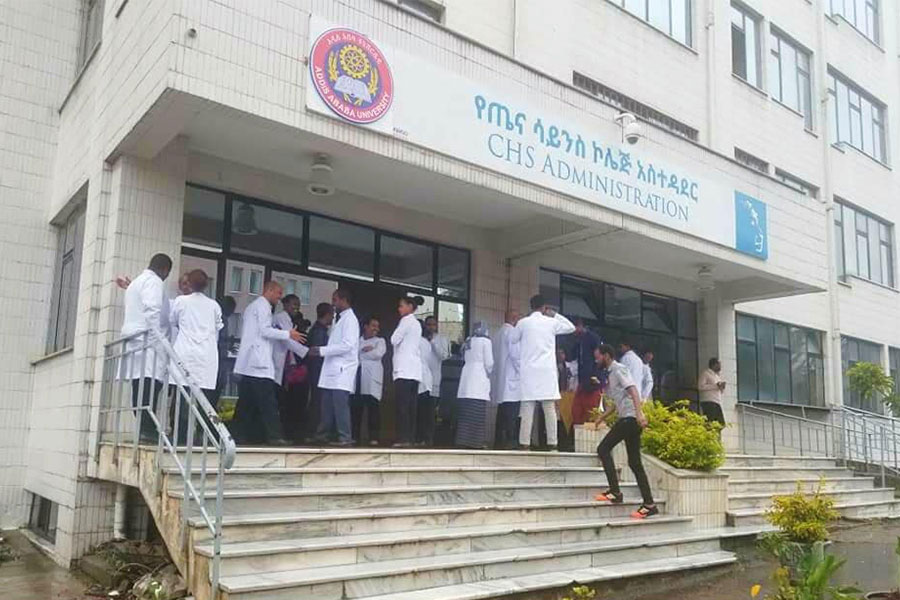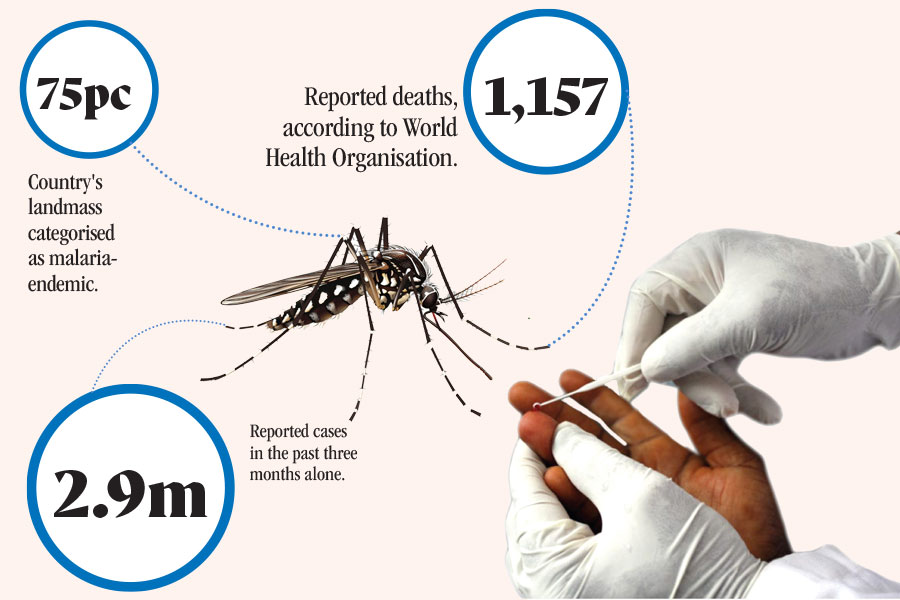
Viewpoints | Sep 01,2024
Jan 7 , 2023
By Seth Berkley , Werner Hoye
The United Nations Climate Change Conference (COP27) in Egypt this past November underscored that sustainability is not only about decarbonisation, electric vehicles, or climate adaptation measures such as flood defences but pandemic preparedness, write Seth Berkley and Werner Hoyer. Seth Berkley is the CEO of Gavi, the Vaccine Alliance, while Werner Hoyer is the president of the European Investment Bank.
The latest Lancet Countdown report, which monitors the health consequences of climate change, highlights the need to prepare for future calamities. As COVID-19 spreads and advances, a recent study suggests that the likelihood of another pandemic increases by two percent each year. In the coming decades, the interplay between the climate crisis and public health could create a perfect storm of global devastation and disruption.
The good news is that prompt steps to transform health systems can avert another COVID-style catastrophe. As with the current pandemic, the obstacles to mitigating climate change are not just scientific or technological but also rooted in geopolitics and market forces. Self-interest can undermine public health, particularly regarding equitable access to resources. Even so, the international community came together to introduce innovative mechanisms like the Pandemic Vaccine Global Access facility (COVAX), which was designed to remove the financial barriers that prevented lower-income countries from obtaining vaccines.
We must launch similar mechanisms for addressing the global public-health impact of climate change. While we already know likely solutions, their effectiveness requires putting them in place before disaster strikes. This is not just a moral imperative but a smart economic choice that would reduce the overall cost of outbreaks and other climate-related catastrophes.
The United Nations Climate Change Conference (COP27) in Egypt this past November underscored that sustainability is not only about decarbonization, electric vehicles, or climate adaptation measures such as flood defenses but pandemic preparedness. Climate change is expected to shift the habitat range of deadly pathogens, causing infectious, mosquito-borne diseases like malaria, yellow fever, and dengue fever to spread as far as northern Europe and Canada. At the same time, the climate crisis threatens to increase the prevalence of malaria, cholera, and schistosomiasis across the developing world.
The world’s poorest countries remain the most vulnerable to climate change, despite contributing the least to creating the problem. That is why the international community must take immediate steps to ensure impoverished; marginalized communities have access to vaccines, treatments, and diagnostics. Given the devastating impact that a single virus has had on billions of lives, livelihoods, and the global economy over the past three years, it is clear that we must urgently take steps to counter climate-related health threats.
The global effort to ensure the equitable distribution of vaccines provides a useful model. The Gavi COVAX Advance Market Commitment, a financial mechanism funded by donors and accelerated by the European Investment Bank, enabled people in the world’s 92 poorest countries to obtain free vaccines. These lower-income countries, representing roughly half of the world’s population, would have struggled to secure access otherwise.
More than 1.6 billion COVAX doses have been delivered to developing countries, helping to ensure that 52pc of their citizens are fully vaccinated, compared to a 64pc global average. This is a remarkable achievement, particularly in the context of intense vaccine hoarding by developed countries, the export restrictions that some countries placed on vaccines and the components needed to produce them, and the actions of some manufacturers that have seemingly prioritized profit over fairness.
The model’s success shows that there is scope for similar innovative financing solutions to climate-related health risks. For example, several private-sector actors are currently exploring a Climate Advance Market Commitment to stimulate innovation and investment in climate solutions. Similarly, there is great potential for mechanisms based on the International Finance Facility for Immunization model, which uses dedicated “vaccine bonds” to frontload long-term donor commitments so that funds can be made available immediately.
Multilateralism is essential to establishing these safety-net mechanisms. COVAX was possible only because it united the financial firepower and know-how of more than 190 governments, along with private-sector partners, civil society groups, and international agencies, around a common cause that benefited everyone. But if the model had already existed before the pandemic, equipped with at-risk contingency financing and surge capacity, it could have mounted its response, the world’s largest and most complex global deployment of vaccines ever, even faster, ultimately saving more lives.
Following COP27, donor governments and multilateral lenders must examine how existing financial mechanisms could be adapted to the fight against climate change to guarantee that funds are made available as soon as a threat emerges. To lessen the overall financial costs of climate-related health risks involves not just prevention but also early action. These safety-net mechanisms should be designed to protect the world’s most vulnerable people, wherever they live.
What matters most is that these steps are taken now. As The Lancet report warns, the countdown to the next global health crisis has already begun.
PUBLISHED ON
Jan 07,2023 [ VOL
23 , NO
1184]

Viewpoints | Sep 01,2024

Radar | Apr 13,2025

Viewpoints | Jan 19,2024

Fortune News | Jan 07,2023

My Opinion | Dec 23,2023

Radar | Sep 23,2023

Fortune News | Jan 01,2023

Fortune News | Aug 12,2023

Commentaries | Jul 10,2021

Fortune News | Nov 16,2024

Photo Gallery | 171962 Views | May 06,2019

Photo Gallery | 162196 Views | Apr 26,2019

Photo Gallery | 151965 Views | Oct 06,2021

My Opinion | 136330 Views | Aug 14,2021





Dec 22 , 2024 . By TIZITA SHEWAFERAW
Charged with transforming colossal state-owned enterprises into modern and competitiv...

Aug 18 , 2024 . By AKSAH ITALO
Although predictable Yonas Zerihun's job in the ride-hailing service is not immune to...

Jul 28 , 2024 . By TIZITA SHEWAFERAW
Unhabitual, perhaps too many, Samuel Gebreyohannes, 38, used to occasionally enjoy a couple of beers at breakfast. However, he recently swit...

Jul 13 , 2024 . By AKSAH ITALO
Investors who rely on tractors, trucks, and field vehicles for commuting, transporting commodities, and f...

Oct 4 , 2025
Eyob Tekalegn (PhD) had been in the Governor's chair for only weeks when, on Septembe...

Sep 27 , 2025
Four years into an experiment with “shock therapy” in education, the national moo...

Sep 20 , 2025
Getachew Reda's return to the national stage was always going to stir attention. Once...

Sep 13 , 2025
At its launch in Nairobi two years ago, the Africa Climate Summit was billed as the f...

Oct 5 , 2025 . By NAHOM AYELE
In Meqelle, a name long associated with industrial grit and regional pride is undergo...

Oct 5 , 2025 . By BEZAWIT HULUAGER
The federal government is set to roll out a new "motor vehicle circulation tax" in th...

Oct 5 , 2025 . By NAHOM AYELE
The Bank of Abyssinia is wrestling with the loss of a prime plot of land once leased...

Oct 5 , 2025 . By BEZAWIT HULUAGER
The Customs Commission has introduced new tariffs on a wide range of imported goods i...